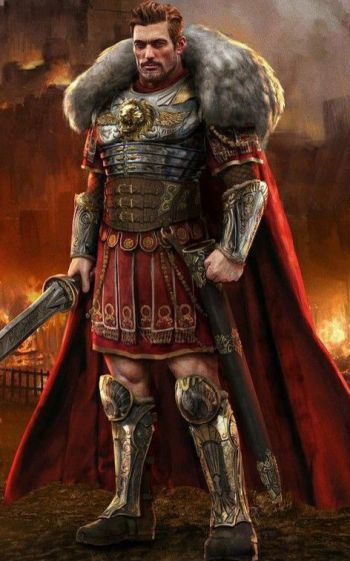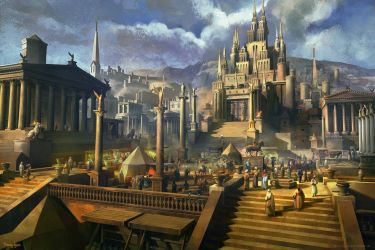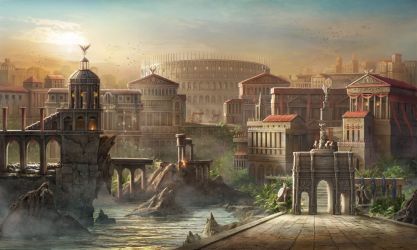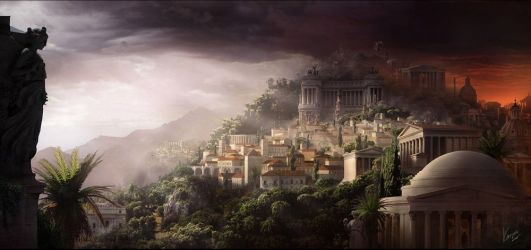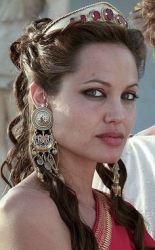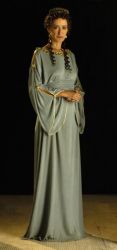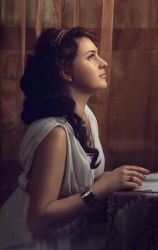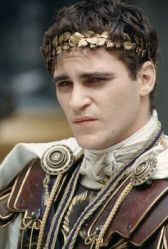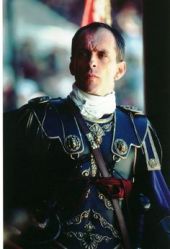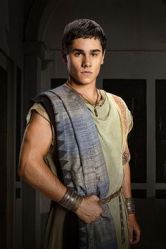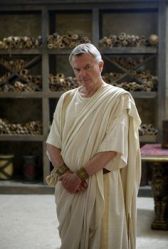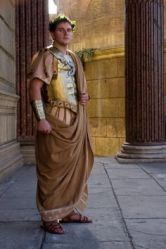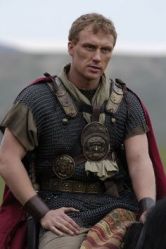Changes: Sim Layout, City-States, RPCSS Factions, and Storyline. Read More
Tiberia
From The Citadel
A traditional Greco-Roman culture similiar to the Euresu of Comraich and central Gor.
The architecture of Tiberia is a marvel of mathematics and marble. Great temples, arenas, forums, and Domus rise high over the coastline above simpler structures both inside and outside of the volcanic Servian walls. Tiberia is located on a peninsula that juts out into the southern sea. The land is warm and the hills dotted with olive groves, vineyards, orchards, sheep and goat herds, root vegetables, and some cereal grains such as Chickpeas, emmer wheat, and lentils. Fishing is a major industry.
The Euresu diet is primarily cereals, vegetables, olive oil, and wine. Seafood, cheese, eggs, meat, and many types of fruit were also available to those who could afford them. The Euresu are also adept at processing and conserving their food using techniques from pickling to storage in honey. They considered themselves gourmets and flavored their food with sauces, herbs, and exotic spices. Tiberia exports as much food as it imports, with an eye for the unusual and exotic.
- Personality
Euresu personalities can be grouped into four separate temperaments; sanguine (enthusiastic, active, and social), choleric (short-tempered, fast, or irritable), melancholic (analytical, wise, and quiet), and phlegmatic (relaxed and peaceful). Euresu prize martial skill, social status, and knowledge. The phlegmatic personality is, more often than not, a slave.
The Euresu are a military culture and respect these traits in the other kingdoms. They are xenophobic and believe their culture is the most advanced and most powerful. There are four social castes within the Euresu; the citizens, the middle class, the plebeians, and slaves. Citizen houses are those that have active officers in the military. If a family can not afford to outfit one of their own as an officer in the military, the family loses citizen status.
The Euresu have a driving force to re-establish their fallen Empire -- it is only the method that is up for continual debate; martial force or diplomatic alliances. They rely heavily upon the written word and expect, like the Dyrlings, for it to be adhered to.
- Appearance
The Euresu are generally dark hair and dark eyes, tanned/olive skin. Men and women are both generally tall, warriors are powerfully built, older men have a propensity to become rotund, most young women who are of citizen families are athletic, while those who have had children or are prostitutes keep more round flesh upon themselves. Men wear their dark hair cut short, and women wear theirs in elaborate styles famous for their curls, waves, and headdresses.
Euresu wear a combination of early Grecian plus fantasy roman with muted Egyptian accents, with styles and modesty going in and out of popularity depending on fashion trends. They wear a lot more white than the Zephrin do. Clothing styles are typically draped cloth worn loose, pinned, or pleated. Grecian garments such as the chiton, himation, peplos, and chlamys are worn by all social classes, while the Roman garments such as the stola and palla for women and togas for men are worn over tunics. Togas are restricted to men of the citizen class. Euresu women love gold bangles and jewelry, while Eresu men tend towards a more regal and less peacock style, sandals, togas, and tunics for the most part. Color choices tend to be carefully combined.
- Traditions
The ancient religion of the Euresu center around the god Mithras. First of all, he is the god of contract and mutual obligation. Mithra may signify any kind of interpersonal communication and whatever establishes good relations between people. Mithra has been called the Mediator. The Euresu pride themselves on their skill in constructing written contracts and negotiating agreements.
Mithra is also the god of the sun, of the shining light that beholds everything, and, hence, was invoked in oaths. He is the god of mutual obligation between the king and his warriors and, hence, the god of war. He is also the god of justice, which was guaranteed by the king. Whenever people observed justice and contract, they venerated Mithra.
The conventional view of life after death in Tiberia conceived of an afterlife wherein the soul separated from the body and then typically lived on in the underworld kingdom of Orcus. Sometimes the spirits of the dead might return to the world of the living, as either Manes (protecting spirits of the dead) or Lemures (malevolent spirits of the dead). The Euresu have a number of superstitions, including the belief in the evil eye, the value of bread as a sacred gift, crows being a sign of misfortune, to give a coin in return for a gift of perfume, not handing someone a knife, knocking on wood to prevent bad luck, and the necessity for the blessing of one's parents
- Expanded Lore
- Further reading and links for the culture obsessed.
Small Council NPCs
| Role | Description |
|---|---|
Ruler |
|
Diplomat |
|
Warlord |
|
Coinmaster |
|
Spy Master |
